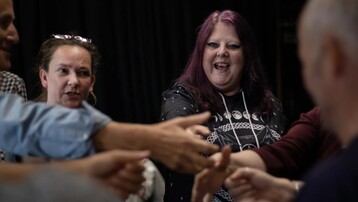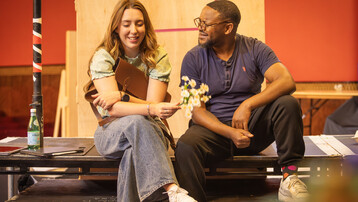News Story

Hi Gusta! So, what roles have you done with ETO so far?
I have worked with ETO for the last two seasons. In the Autumn, I was the Stage Manager for Back Into the World, the learning and participation tour. Then in Spring ’22 I was the rehearsal room DSM on La Bohéme, as well as continuing my L&P work, which involved Stage Managing Paper and Tin and How To Find Your Name. I also had the opportunity to cover the ASM track for The Golden Cockerel – so it was a very busy season all round!
What has your ETO experience been like?
ETO was a very steep learning curve! It was my first time working in opera stage management, and my first time working in touring theatre so it was a bit of a double edged sword. Luckily, working on the children’s shows has been an incredible experience and immediately I felt like I was a part of something really special. Getting to take on the theatre show as well this season added to that, as I was suddenly part of a much bigger team working on some pretty spectacular productions. It also meant longer days, and more travelling as we went to a lot more venues than we did on the previous tour. It’s busy and exhausting and also one of the best things I have ever done. Luckily, because everyone else is in the same boat we all pull together and it does become like a family – especially on tours like the spring one where we spent five months together!
What were your prior experiences of opera/classical music?
I was very lucky that I had quite a musical family, so growing up I was encouraged to take music lessons and sing in the school choir. My grandfather in particular was a singer and an opera fan, and I think I was 10 when he gave me tickets to see The Magic Flute at the Royal Opera House. I remember seeing it and was totally blown away by the music and the theatre of the whole thing and from then on I was totally hooked – I think my parents got very sick of me demanding to listen to the CD over and over in the car! Classical music remained a big part of my life, and when I went to university I sang as a choral scholar and also played in orchestras. There was a brief sideways swerve to musical theatre at one point (mainly because my university had several very good musical theatre societies!) and I also did a lot of work on plays.
How did you get into stage management?
I totally fell into stage management! I started out very much thinking that I was going to be a performer, and for a while I did pursue that – I didn’t even really realise what a stage manager did! When I went to university to read English, I got very heavily involved in the student theatre societies, first as a performer, then as a director and producer. It was then that I realised that I had more interest in the backstage side of things rather than being on the stage, and started doing bits and bobs for shows, doing lighting and sound design, a bit of scenic construction, working on flies and stage and production management as well. A friend of mine then suggested that I should look into the Production and Technical Arts course at LAMDA, as you could learn about all the different elements of technical theatre and discover if a) it was really what I wanted to do and b) if I did, which route was the one I wanted to go down. I did, I applied, and then when I was there discovered that stage management was absolutely the right thing for me to do.
What are the main responsibilities of a stage manager?
There are a few different types of manager, and responsibilities will vary depending on which role you are doing. An Assistant Stage Manager is responsible for props and sometimes wardrobe. In the rehearsal period they will sit in on rehearsals and learn the show and make notes of cues, but will also be sourcing props. Then, during the show, they will be in the wings, making sure that everyone has the right props on stage, helping with scene changes and cueing people on. The Deputy Stage Manager is the one ‘on the book’, so they spend the whole rehearsal period in the rehearsal room, making a note of blocking and then during tech will put all of the cues for lighting, flys etc. into the book. Then, during the show, they will follow the score and will ‘call’ the show, meaning that they tell lighting, crew, stage management (and sometimes sound, but not so much in opera!) when their cues will happen. Then there is the Company Stage Manager, who is responsible for looking after the whole company. They will make the schedule, deal with illnesses and absences and generally make sure that everything runs smoothly – lots and lots of emails and admin! During the show, they will also be in the wings keeping an eye on any elements that could be tricky or potentially dangerous, such as fights, pyrotechnics etc. as well as helping with scene changes. On the Learning and Participation shows, it’s slightly different as I was the only Stage Manager, so I was driving the van, loading and unloading and getting the set up at each school, doing cues during the show as necessary (sometimes in costume!) and generally making sure that the company knew what was going on and where they needed to be when.
Do you have any comments or experiences to share about being a woman in stage management?
I think there is a big shift in the industry at the moment and a huge push for greater equality and diversity, and that’s something that will only continue. It’s encouraging and exciting to see that happening and to be a part of it, especially this season where we had an all-female stage management team! I’ve been very lucky to have mainly worked as part of female-led teams, so I have had very positive experiences from the stage management side of things. There are some incredible people out there laying the ground work to make it more equitable and diverse, and whilst there is some great work being done to get more women into stage management there is still a way to go in terms of making sure that backstage is representative of on stage and audiences.
What will you be working on next?
I did some work for Haringey Shed on their schools tour, and then over the summer I am with IF opera as their Stage Manager for the summer festival down in Belcombe Court. They’re doing LaRondine and then a double bill of Donizetti’s Rita and Wolf-Ferrari’s Il Secreto Di Suzanna, so some good variety there to keep me on my toes. Then in the Autumn, it’s back to ETO (because I just can’t stay away) when I’m going to be the Deputy Stage Manager on Agrippina- so it’s a busy few months but really mixed and interesting stuff, which is one of the best bits about being a freelancer in this industry.


